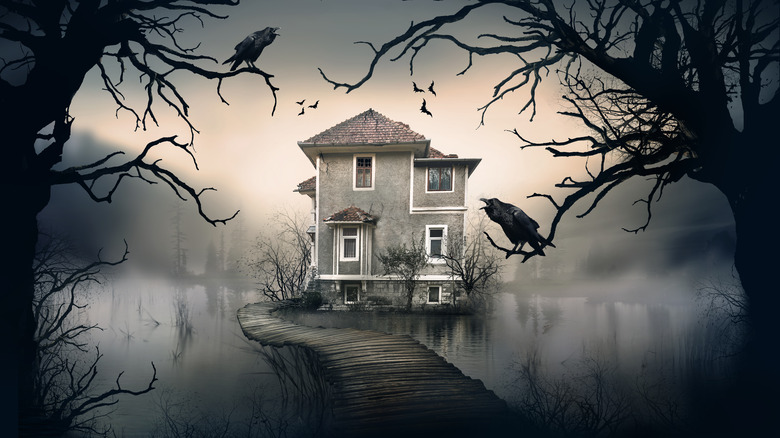How To Find Out If Someone Has Ever Died In Your House
Throughout living history, death has remained a constant presence. In the past century though, society's relationship with death has changed into a less familiar one, according to The Atlantic. Until the first half of the 20th century, people generally died at home. As the medical industry has increasingly taken up that mantle since WWI, the very idea of someone dying in your home can be unnerving.
According to Real Estate Agent, nothing happens to the value of a house after a naturally occurring death, even though potential buyers may still want to know about it. Having said that, a recent study out of Harvard found that (in Hong Kong, where the research was done) there was a 25% average drop in the value of properties where an unnatural death had occurred.
Even if you aren't concerned about previous deaths in your home, consider what a survey by YouGov pointed out, as reported by NPR. Around two in five Americans are believers in ghosts. That's a significant chunk of the market; if you're thinking of selling, it's certainly enough to make it worth your time to find out if someone has ever died in your house.
How to find out if anyone's died in your house for free
According to CNN Money, rules for what information sellers are required to pass on to buyers ahead of a house sale vary by county and state, even in regards to in-home deaths. When it comes to murder hurting a house's value, California and New York are the strictest about disclosures. However, in Alberta, Canada, according to Real Estate Council Alberta, a seller doesn't have to tell a buyer if someone has died in the property, but if the buyer asks about it, the seller must give an honest answer (or none at all). So the first step to finding out if someone has ever died in your house is to ask the person who sold it to you!
It might not always be possible to check with previous owners, and even then, they might not want to disclose information that could negatively impact the price of the property. One free and easy source of information on potentially stigmatized property is House Creep. It is an easy-to-search website full of details about the locations of violent crimes, grow ops and meth labs, and other nefarious happenings. Although, according to Global News, House Creep is crowdsourced, meaning it encourages users to fact-check any data they find there themselves. This also means it's unlikely to be as useful for people searching for information from less populated areas.
How to dig a little deeper
If the regular methods just aren't cutting it, then there are a few more options available to the committed death researcher. The first is to pay the money to use a tool specially developed for this job, DiedInHouse.com. This site is designed to scour databases and records to find out if anyone has ever died at the address you search for. According to TIME, it costs $11.99 for a single search, which is going to really add up if you have multiple potential houses to screen, but isn't too bad for peace of mind if you just want to check one place.
The determined and old-school route is through your local authority's records of births, deaths, marriages, divorces, wills, etc., according to the National Archives. These are called Vital Records and you can search for any and all of the people mentioned on the title of the property, the previous owners, and whether they died while owning the property. The causes of death ought to be listed as well. Depending on what sort of databases are kept by your local records office or library, you might be able to search all sorts of records, such as local papers, for details of deaths at or around your home.
Finally, you could talk to the neighbors. Given that, according to the Stanford School of Medicine, 20% of Americans still die at home, the memory of the neighborhood may well contain the details you're looking for.


